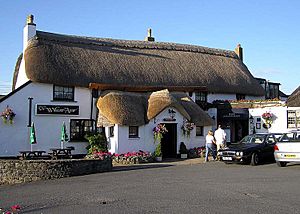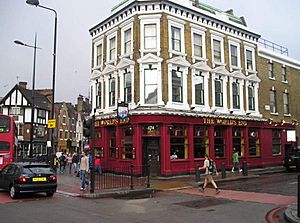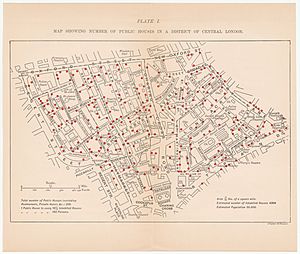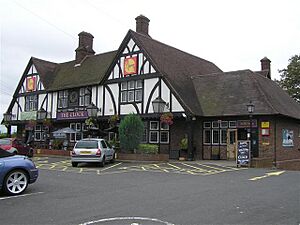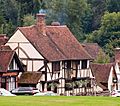Pub facts for kids
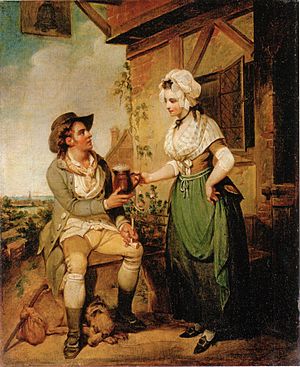
A pub, short for public house, is a special place where grown-ups can buy drinks like beer (including ale) and cider. It's a popular spot for people to meet up and socialize. Pubs are a big part of the culture in places like Britain, Ireland, Brittany, New Zealand, South Africa, and Australia. In many villages, the pub is the main meeting place for everyone. Back in the 1600s, a famous writer named Samuel Pepys even called the pub "the heart of England."
Pubs have a long history, going all the way back to Roman taverns. They evolved from Anglo-Saxon alehouses. In 1393, King Richard II made a rule that pubs had to put a sign outside. This helped people called ale tasters find them easily to check the quality of the drinks.
Most pubs offer different kinds of beers and ales. They also often sell wines, spirits, and soft drinks, plus meals and snacks. The person who runs the pub is called the pub landlord or landlady, or a publican. Regular customers often call their favorite pub their "local." People choose their local pub for many reasons: it might be close to home or work, have their favorite drink, serve good food, or have a friendly vibe. Many pubs also have fun activities like darts teams, skittles teams, or pool and snooker tables. The pub quiz, where teams answer questions, became popular in the UK in the 1970s.
Contents
The History of Pubs
People in the British Isles have been drinking ale for thousands of years, even since the Bronze Age. But the first inns, called tabernae, appeared when the Roman Empire arrived in the 1st century. These inns were built along the new Roman roads and offered travelers a place to rest and get food and drink.
After the Romans left in the 5th century, the Anglo-Saxons started their own alehouses. These were often in homes and quickly became places where people could meet, chat, and help each other in their communities. Laws from the 10th century even mentioned fines for causing trouble at these alehouses. This is how the modern public house, or "pub," began.
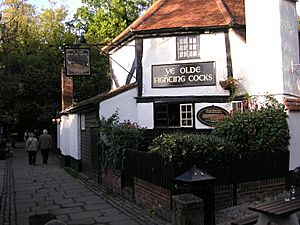
In the early Middle Ages, travelers could stay overnight at monasteries. But as more people traveled for pilgrimages, there was a need for more places to stay. By 1577, a survey found over 14,000 alehouses, inns, and taverns in England and Wales. That's about one pub for every 187 people!
Inns: A Place to Stay and Eat
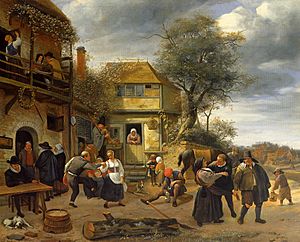
Inns are buildings where travelers can find a place to sleep, and usually get food and drinks too. They were often found in the countryside or along main roads. In Europe, some inns are hundreds of years old. Besides helping travelers, inns were also important meeting spots for local communities.
Today, what often sets inns apart from pubs is that inns usually offer overnight accommodation. Pubs mainly serve drinks and food, but less often have rooms to stay in. Historically, inns were grander places. They didn't just provide food and lodging, but also stables and food for travelers' horses. Some even had fresh horses for mail coaches.
Famous old inns in London include The George, Southwark and The Tabard. While many pubs still use "Inn" in their name, there's no official difference between an inn and a pub anymore.
Who Works at a Pub?
Pubs can be owned and run in different ways. Some large breweries own many pubs themselves. Others are run by big companies. No matter who owns it, a pub is managed by a "landlord" or "landlady." Many people work at a pub to make sure everything runs smoothly. Bartenders (also called "barmen" or "barmaids") serve drinks at the bar. In most pubs, you order your drink at the bar and then take it to your table. Some pubs also have servers, called waiters or waitresses, who bring drinks to people sitting at tables.
Pubs that serve food have cooks, dishwashers, and servers to prepare and serve the meals. Sometimes, bands or singers perform at pubs in the evening. These entertainers usually aren't employees; instead, the pub makes a deal with them to perform on certain nights for a fee.
Pubs Compared to Nightclubs
Another type of place that serves drinks is a nightclub. Like pubs, some nightclubs also serve food and have bands or singers. However, people usually go to nightclubs mainly for the music and dancing. Nightclubs often have a much wider selection of drinks than pubs. They might sell many different kinds of spirits, liqueurs, wine, and aperitifs.
The bartenders at nightclubs often know how to make a lot more different mixed drinks, or cocktails, than those who work in pubs.
Images for kids
-
Goldfinger Tavern, Highworth, a pub from the mid-20th century
-
A Victorian pub in Rotherhithe, Greater London
-
The Eagle, City Road, Islington, London, with a nursery rhyme line about an older pub
-
The Dutch House (now closed), a typical 1930s roadhouse on the busy A20 road in Eltham, Greater London.
-
The pub sign of The George, Southwark, showing St George fighting a dragon
-
Indoor Quoits being played at a pub in Parkend, Gloucestershire.
-
Pub grub – a pie, with a glass of beer
-
'The Crooked House', Himley, is famous for its leaning shape, caused by mining underground
-
Jamaica Inn in Cornwall inspired a famous book and movie.
-
The Red Lion in Whitehall is near the Houses of Parliament and is visited by Members of Parliament (MPs) and journalists.
-
The made-up Queen Victoria pub from the TV show EastEnders, London
See also
 In Spanish: Pub para niños
In Spanish: Pub para niños


